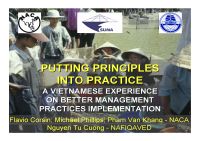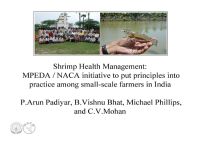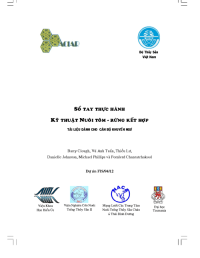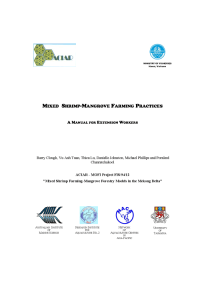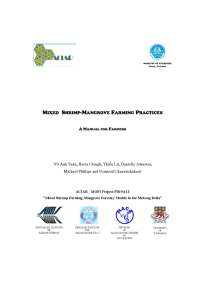This presentation provides an overview of Vietnamese experience on the implementation of better management Practices (BMPs) and good aquaculture practices (GAP) in shrimp aquaculture. Practices were implemented collectively by encouraging small-scale farmers to form groups that collaborate on issues such as screening seed for disease and improving water quality management. Improvements to crop outcomes were observed. The results presented include the profitability of BMP adopted ponds.
Presentation on a MPEDIA/NACA intiative to implement better management practices for shrimp farming amongst small-scale farmers in India via formation of farmer groups. The practices are based on the International Principles for Responsible Shrimp Farming. Adoption of improved farming practices reduces the incidence of disease and improves crop outcomes for small-scale farmers. This presentation was made at the World Aquaculture Society Conference in Bali, Indonesia, 2005.
Sổ tay nẩy với mục đích giúp đỡ cho cán bộ khuyến ngư hướng dẫn người nông dân kỹ thuật nuôi tôm nhằm mục đích đạt được sản lương và thu nhập ngày càng cao trong hệ thống nuôi kết hơp tôm - rừng ở Đồng bằng Sông Cửu Long. Với những kỹ thuật đơn giản, thông thường giúp cho ngư dân từng bước gia tăng sản lương mà ít bị rủi ro.
This manual has been prepared to assist extension officers to advise farmers on techniques for improving yields and farm income in mixed shrimp farming-mangrove forestry farming systems in the Mekong Delta. It focuses mainly on simple, common sense techniques that will allow farmers to make step-by-step improvements to production without taking unnecessary risks. The manual is based on a 6-year collaborative research and development project between the Governments of Vietnam and Australia.
This manual has been prepared to assist farmers with techniques for improving yields and farm income in mixed shrimp farming-mangrove forestry farming systems in the Mekong Delta, Vietnam. It focuses mainly on simple, common sense techniques that will allow farmers to make step-by-step improvements to production without taking unnecessary risks. The techniques and recommendations covered in this manual are based on the experience of a 6-year collaborative research and development project between Vietnam and Australia.
